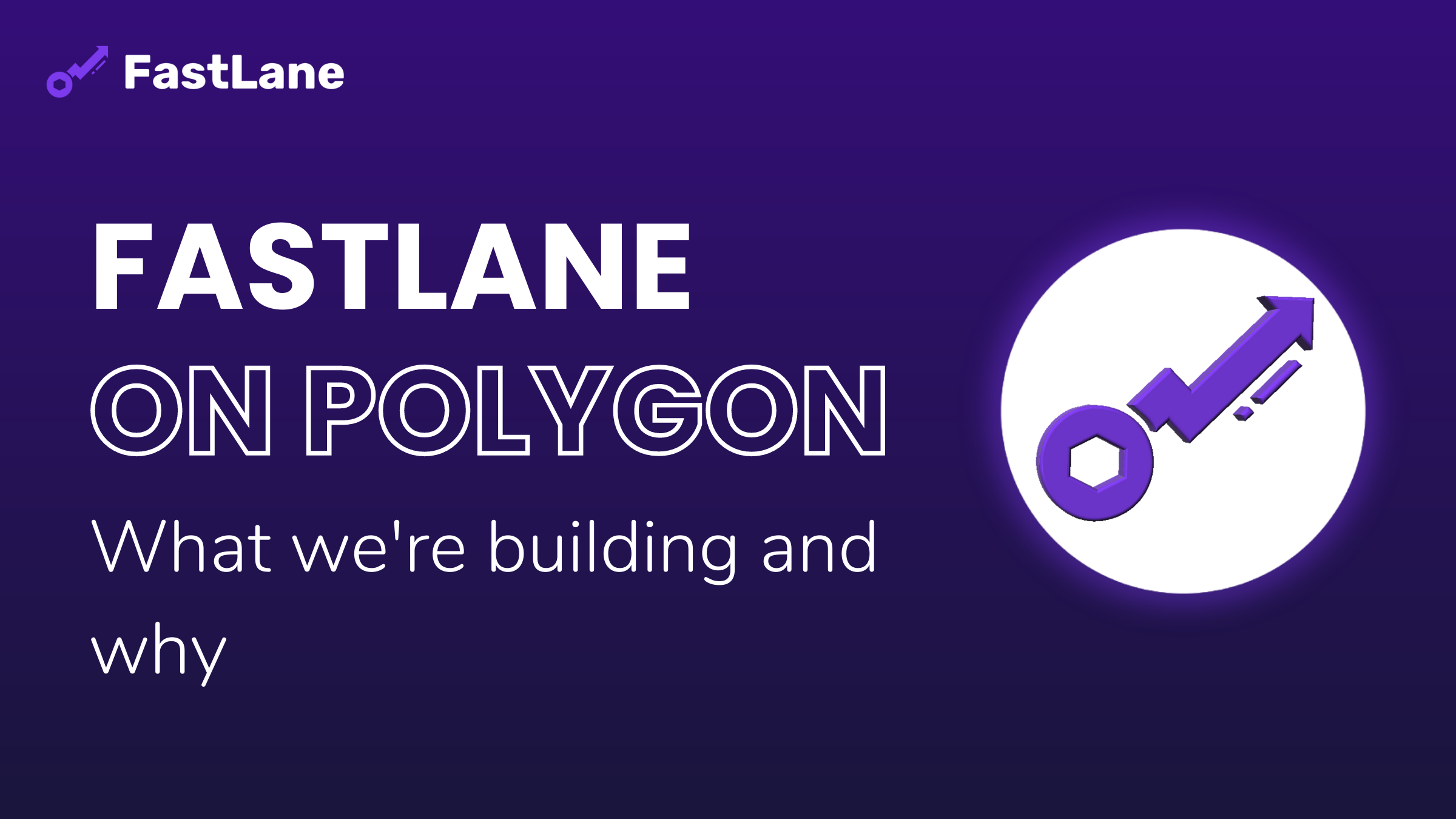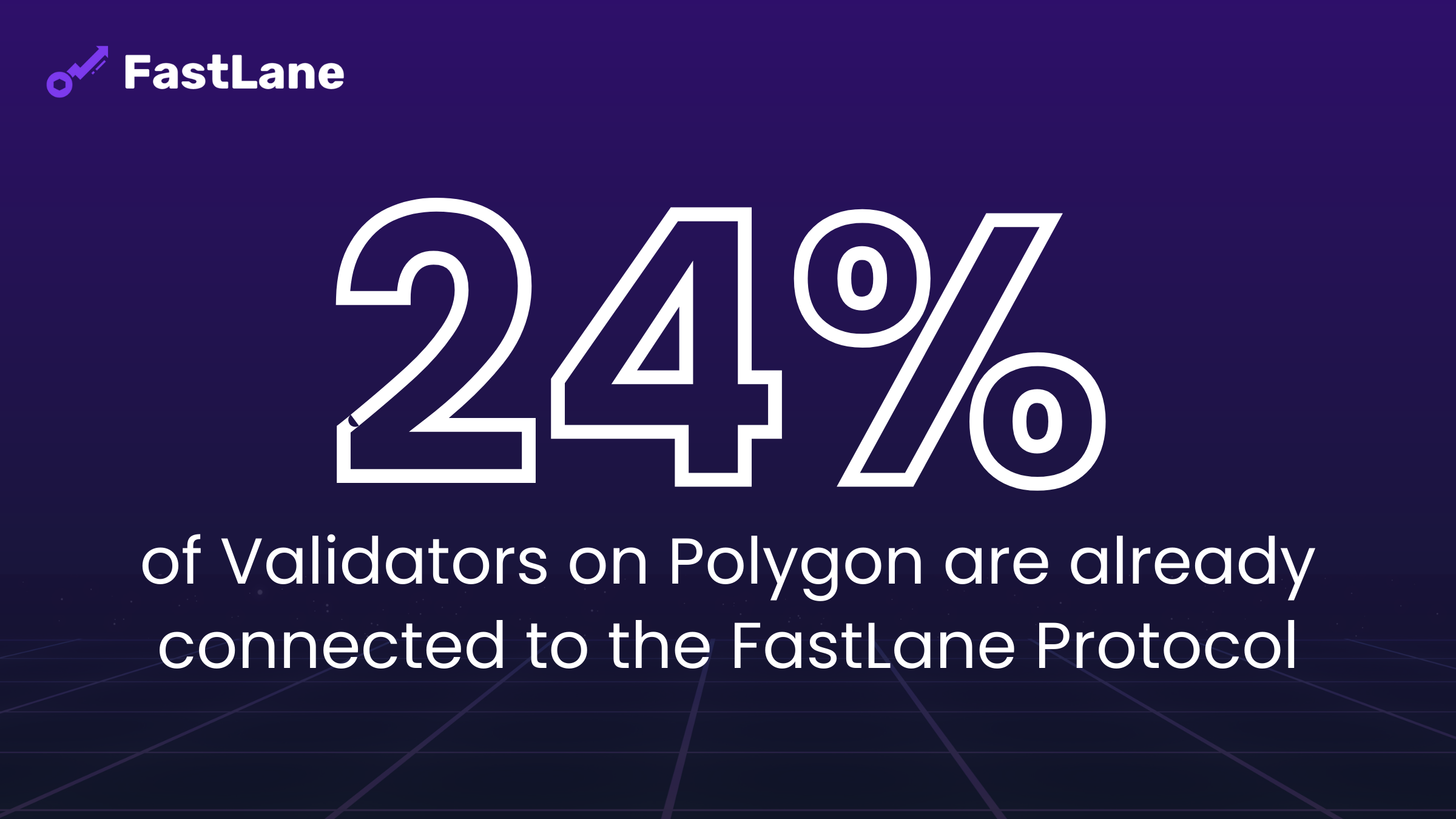Introducing FastLane on Polygon
2023-06-16

BUIDL
NEWS
MISSION
We’re excited to be introducing the ‘FastLane on Polygon’ protocol. FastLane on Polygon (aka ‘PFL’ or simply ‘FastLane’) is an easy-to-integrate protocol that rewards participating validators for protecting the health of the Polygon blockchain. The FastLane protocol is designed to compensate validators by monetizing transaction bottlenecks on Polygon, increasing successful trading outcomes for FastLane-enabled traders and leading to reduced transaction spam and a healthier Polygon network.
FastLane for Profit Seeking Algorithmic Traders
Algorithmic traders (aka ‘Searchers’) such as arbitrageurs and liquidators (MEV bots), NFT traders, and other algo-degens make up a large portion of transactions on the Polygon blockchain. Arbitrage opportunities are typically found in the ‘mempool’ (in the form of backruns or liquidations) resulting from large DEX trades or other price-updating transactions. These opportunities result in multiple traders competing for a single prize. Improving the likelihood of a successful trade (while minimizing transaction costs) is vital for any algorithmic trader. The FastLane protocol seeks to ensure transactions are always as fast as (or faster than) Polygon’s “default”, whilst also seeking to reduce the correlation between the number of transactions and trading success.
Polygon Blockchain Overview & Transaction Spam
Polygon is a Proof of Stake (‘PoS’) blockchain made up of a network of connected blockchain nodes. Special validator nodes are selected to add new blocks to the blockchain, with transaction gas-price and the transaction propagation timing determining the inclusion and ordering of transactions in each block. For profit-seeking algo-traders, ensuring their trades land in the correct place, fast, and matching the transaction propagation pattern of their target opportunity-generating transaction are key requirements for winning trades.
The Polygon blockchain is designed so that validator nodes peer in a way that effectively safeguards the network against DDOS-type attacks, but which also results in a small percentage of transactions being delivered up to 500 ms faster than others (this is what incentivizes spam transactions). It’s important to note this is not a Polygon-specific problem, with the origin of the issue linked to this line of code which affects several prominent blockchains with nodes based on GETH.
Due to the random way that transactions travel through the network to validators, transactions can take many different paths to the validator that can affect the likelihood of a successful trade. Searchers seeking to win an opportunity need to not only ensure that their trade has the right gas price to land at the right position in the block, but that it also matches the propagation pattern of the opportunity-creating transaction. Having to match the propagation pattern of the opportunity transaction, combined with the small chance that the opportunity transaction may receive the 500ms speed boost incentivizes profit-seeking traders to send many transactions for each opportunity in an attempt to increase the likely success of their trade (and therefore inadvertently increasing transaction spam on the network).
Improved Trading Outcomes, Network Health & Revenue Generation for Validators
The FastLane protocol works by removing the small chance that some transactions will receive a speed advantage and replacing it with a highly efficient and transparent auction system. Participating validators are rewarded for reducing spam and safeguarding the network by receiving the proceeds of any auctions occurring on the PFL relay during their blocks. The software is extremely easy to set up, without requiring validators to run any custom code or reveal sensitive information to Searchers.
This auction system allows Searchers to bid for FastLane access during Validator block sprints, increasing the likelihood of successful trades for Searchers. Searchers can submit their transaction to the PFL relay, where an auction is started for a particular opportunity transaction, the opportunity and the winner of the auction will be sent to the validator through the FastLane before the transaction can reach the validator through the regular network.
The winning searcher’s payment to the validator is held in the PFL Validator Vault contract.
By removing the small likelihood that a random transaction will receive a speed boost, we eliminate the incentive to spam the network with unnecessary transactions. This reduction in bot spam leads to a healthier network, and can potentially lower the data transfer cost for both validators and searchers. In our commitment to the Polygon community, the FastLane protocol does not facilitate transactions that cause overt harm to Polygon’s users and we have built-in protections to disincentivize malicious trades such as sandwich attacks.

With 24% of validators on the Polygon Blockchain already connected to the FastLane protocol, our goal of safeguarding the Polygon community is well underway. We’re excited about our mission and will continue to deliver robust, efficient, and user-friendly solutions to our community.
Polygon validators looking to connect to the FastLane protocol can find our onboarding guide here. You can send any questions to [email protected] or simply join the community in our discord server.
Searchers looking to get started can find the searcher onboarding guide as well as integration examples in our documentation and can also join our discord server to ask the team any questions.